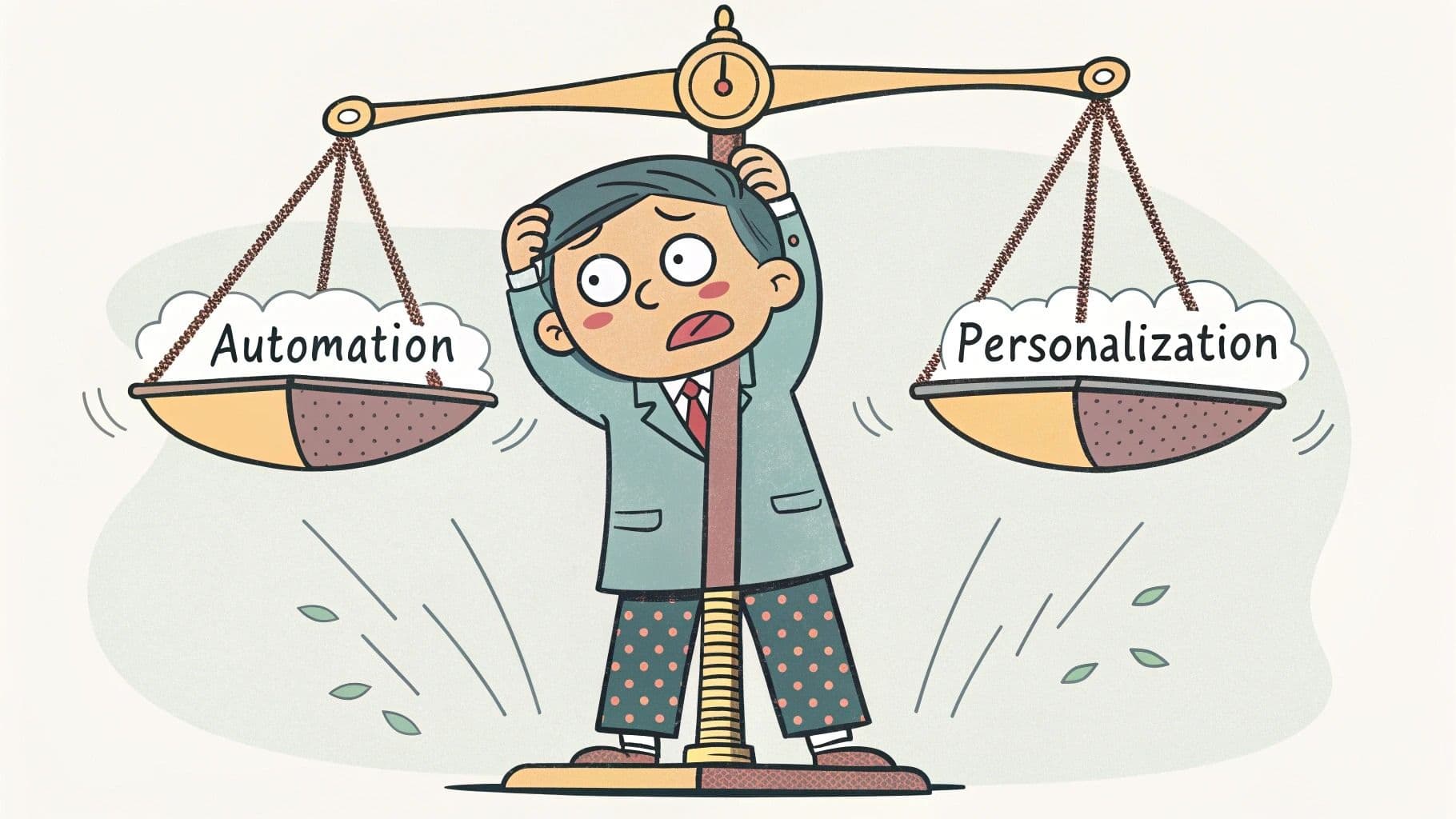How to Prioritize Leads with AI Workflows
Learn how to leverage AI workflows for efficient lead prioritization, boosting sales effectiveness and response times.

Responding to leads quickly can boost your chances of connecting with prospects by 100x compared to waiting 30 minutes. AI-powered lead scoring offers a smarter way to focus on high-potential prospects, saving time and improving sales outcomes. Traditional methods often rely on gut instinct or demographic data, which can lead to missed opportunities. With tools like Latenode, businesses can automate lead prioritization using real-time insights, ensuring sales teams act at the right moment.
How to build an AI Lead Scoring System in 19 MIN! | Make.com | ChatGPT | Tally | FULL TUTORIAL
Getting Started with AI Workflows for Lead Prioritization
Using AI for real-time lead scoring has become essential for maintaining responsiveness and accuracy. Setting up AI-powered workflows for lead prioritization is simpler than you might think, especially with tools like Latenode. This low-code platform combines an intuitive visual interface with advanced AI capabilities, allowing you to deploy workflows in just a few days.
Why Choose Latenode for Lead Automation?
Many platforms make you choose between ease of use and advanced functionality. Latenode bridges this gap by offering a drag-and-drop builder for simplicity, while also supporting custom coding for more complex needs. Its AI-native design lets you integrate models like OpenAI, Claude, Gemini, or even your own custom AI directly into workflows - no need for juggling API keys or dealing with complicated setups.
Pricing with Latenode is straightforward and starts at just $5 per month. Unlike task-based pricing models, which can quickly grow expensive as lead volume increases, Latenode charges based on execution time. This makes it a practical option for businesses managing thousands of leads each month. Plus, the platform includes a built-in database, so you can store and query lead data without relying on external storage solutions.
"Latenode is an extremely impressive product! Latenode's support for custom code has allowed us to tailor automation solutions precisely to our (and our clients') needs..." - Wael Esmair
This all-in-one approach reduces complexity while still offering the flexibility to scale as your business grows.
Setting Up Your Workflow in Latenode
Creating an AI-driven lead prioritization workflow in Latenode is straightforward, thanks to its visual design tools. Start by setting up a new workflow and defining your trigger. This trigger could be anything from a new lead entering your CRM to a form submission on your website or a webhook from a lead generation tool.
Next, connect your data sources. Once the data is flowing, configure your AI models to analyze and score leads based on your specific business criteria. For example, you might prioritize leads based on engagement behavior, industry, or company size.
Latenode’s AI-powered JavaScript assistant can generate optimized code for complex scoring tasks. This feature allows you to implement advanced scoring algorithms without needing to build everything from scratch, saving you valuable time.
The platform also supports branching and conditional logic, enabling you to create workflows that adapt dynamically to different lead characteristics. For instance, you can route enterprise leads through a tailored scoring model, while small business leads follow a different path. This flexibility ensures that your workflows align perfectly with your business needs.
Integrations and AI Models in Latenode
Once your workflow is set up, Latenode’s extensive integrations and AI capabilities take your lead scoring to the next level. With connections to over 300 applications, data integration is seamless.
Latenode’s AI models go beyond basic scoring to include features like text classification, sentiment analysis, and predictive modeling. These tools can help you assess lead communications, gauge buying intent based on website activity, or predict conversion likelihood using historical data. With support for over 200 AI models, you can combine multiple approaches to achieve highly accurate results.
"AI Nodes are amazing. You can use it without having API keys, it uses Latenode credit to call the AI models which makes it super easy to use. - Latenode custom GPT is very helpful especially with node configuration" - Islam B., CEO Computer Software
For example, you could set up an AI-powered system to categorize leads automatically and route them to the appropriate team. Leads expressing pricing concerns might be directed to a sales engineer, while those inquiring about implementation timelines could be escalated to a senior account executive.
Latenode’s ability to integrate multiple AI models within a single workflow allows for comprehensive lead analysis. Imagine using one model to analyze email sentiment, another to evaluate demographic fit, and a third to predict deal size. These insights can be combined into a dynamic lead priority score, updated in real time as new information becomes available. This not only improves response times but also boosts conversion rates by ensuring that high-priority leads are addressed promptly.
Key Elements of Effective AI Workflows
Creating successful AI-powered lead prioritization systems relies on three essential components that work in harmony to turn raw prospect data into actionable insights for sales teams. Companies leveraging AI-driven lead scoring can achieve a 51% boost in lead-to-deal conversion rates, but this success hinges on properly implementing and integrating these core elements.
Data Integration and Enrichment
Effective lead scoring begins with gathering and enriching data from multiple sources. Your AI workflow needs access to a variety of information, including firmographic data (e.g., company size, industry, revenue), technographic details (e.g., technology stack, software usage), behavioral signals (e.g., website activity, email engagement), and intent data (e.g., content downloads, visits to pricing pages). This combination creates comprehensive lead profiles.
Latenode simplifies this process with its ability to connect to over 300 apps. It can pull data from tools like CRMs, marketing automation platforms, website analytics, social media channels, and customer service systems into a single, unified workflow. With its built-in database, Latenode stores and enriches this data without requiring external storage solutions, ensuring everything is accessible for real-time analysis.
Research shows that integrating data effectively not only improves the quality of sales-qualified leads but also shortens sales cycles. As the AI-driven data enrichment market is projected to hit $5 billion by 2025, businesses are increasingly recognizing its importance - 67% of companies now use AI to analyze customer behavior and predict buying intent. By automatically collecting and processing data from diverse sources, your workflow can create a 360-degree prospect view that updates in real time.
With enriched data securely in place, the next step is implementing dynamic, real-time lead scoring.
Real-Time Lead Scoring
Static lead scores quickly lose relevance as prospect behavior evolves. To stay ahead, AI workflows must continuously analyze incoming data and adjust lead priorities in real time. This dynamic scoring ensures your sales team focuses on prospects demonstrating the strongest buying signals at any given moment.
AI algorithms excel at identifying behavioral patterns that precede purchases, such as increased website visits, engagement with specific content, or frequent pricing page views. When a prospect exhibits these behaviors, the AI updates their priority score and can even send alerts to your sales team.
Latenode supports this real-time scoring approach through its integration with models like OpenAI, Claude, and Gemini. You can design workflows to analyze prospect communications for sentiment and intent, automatically updating lead scores based on email replies, chat interactions, or support ticket content. The platform’s conditional logic also allows for tailored scoring models, ensuring that enterprise leads and small business prospects are evaluated using criteria suited to their profiles.
Personalized Recommendations
The final key element turns lead scores into actionable strategies. Instead of merely ranking prospects, advanced AI workflows provide specific recommendations on how to engage each lead. These insights are based on the individual’s behavior, preferences, and current stage in the buying process.
AI analyzes patterns from successful conversions to recommend the best outreach timing, messaging, and communication channels for each prospect. This level of personalization surpasses basic demographic segmentation by incorporating behavioral data and engagement history. For example, technical decision-makers might prefer detailed product specifications, while executives may respond better to conversations focused on ROI.
Your AI workflow should identify the most effective approaches for various prospect types and suggest tailored talking points, relevant content, or demonstration strategies. Latenode enables this by combining multiple AI models within a single workflow. One model might analyze email sentiment, another could assess demographic fit, and a third might predict the best outreach timing. These insights come together to deliver actionable recommendations directly into your CRM or sales dashboard.
Additionally, Latenode’s headless browser automation enhances personalization by tracking prospect website behavior and social media activity. This data feeds into algorithms that suggest tailored content, meeting agendas, or follow-up strategies based on each prospect’s demonstrated interests. By integrating these personalized insights into your sales process, Latenode helps streamline efforts and improve outcomes.
sbb-itb-23997f1
Implementing and Optimizing Lead Scoring Workflows
Creating an AI-powered lead scoring system involves integrating data sources, configuring AI models, and establishing feedback loops to refine accuracy over time. By following a structured approach, you can identify high-value leads and ensure your sales team focuses on the most promising opportunities.
Step-by-Step Workflow Setup
Start by defining the criteria that separate high-value leads from lower-priority ones. These criteria should include actions and attributes that signal buying intent. For example, high-intent actions might include visiting your pricing page multiple times, downloading product specifications, or requesting a demo. On the other hand, demographic attributes like company size, industry, or technology stack can also play a role in determining lead quality.
Latenode's visual workflow builder simplifies this process with its drag-and-drop interface. Begin by creating a new workflow and connecting your primary data sources, such as your CRM, marketing automation tools, and website analytics. Use Latenode's built-in database to centralize lead data for streamlined analysis.
Next, configure your AI models to interpret the incoming data. Latenode supports multiple AI models, including OpenAI, Claude, and Gemini, which can work together within a single workflow. For instance, one model might analyze email sentiment and engagement, another could assess demographic fit based on your ideal customer profile, and a third might evaluate behavioral signals from website interactions. These models combine their insights to produce a composite lead score that updates in real time as new information becomes available.
Assign weighted points to various lead actions based on their historical correlation with conversions. Actions strongly linked to conversions should carry higher weights. Additionally, use conditional logic to tailor scoring rules to different lead profiles, ensuring your criteria align with your business goals across various industries and company sizes.
Once your workflow is configured, utilize Latenode's integrated tools to monitor and refine the scoring process in real time.
Using Latenode's Built-In Tools
Latenode offers several built-in features to enhance lead scoring workflows, including its database, execution history, and headless browser automation.
The execution history feature provides detailed logs of each workflow run, showing how leads were scored and which data points influenced those decisions. This transparency is invaluable for troubleshooting and understanding scoring outcomes. For instance, if a high-value lead receives a low score, the execution history allows you to pinpoint whether critical data points were missed or scoring rules need adjustment.
Latenode's headless browser automation adds another layer of insight by tracking prospect behavior on your website and social media platforms. This automated process captures additional behavioral signals, such as engagement with specific content, that might otherwise go unnoticed. These signals are then used to update lead profiles continuously, ensuring your scoring system remains dynamic.
Webhook triggers allow for real-time responses to changes in lead behavior. For example, when a prospect's score surpasses a predefined threshold, the workflow can automatically notify sales reps, update CRM records, or initiate personalized email campaigns. This ensures that high-priority leads receive immediate attention when their interest is at its peak.
These tools provide the foundation for ongoing refinement, which is addressed in the next section.
Best Practices for Optimization
After setting up your workflow, it's essential to regularly refine it using actual sales outcomes and evolving market trends. Start with straightforward automations and gradually incorporate more complex features as you become familiar with the platform. This step-by-step approach minimizes errors and helps you identify which components have the most impact on scoring accuracy.
Regular retraining of your AI models is crucial for maintaining precision. Latenode simplifies this by offering performance metrics and execution logs that help you identify discrepancies between predicted lead quality and actual sales results. A monthly review of these metrics can help you fine-tune your scoring system.
Incorporate feedback from your sales team to improve lead scoring. When sales reps mark leads as qualified or unqualified in your CRM, this data can flow back into your Latenode workflow, refining future scoring decisions. Latenode's seamless CRM integrations ensure this process happens automatically, allowing your models to learn from real sales interactions.
Track campaign performance using Latenode's real-time analytics dashboard. Metrics such as lead-to-opportunity conversion rates, average deal size by lead score, and time-to-close for different score ranges can help you adjust scoring weights and identify the most predictive data sources.
Focus on automating repetitive tasks first, then expand to include more advanced AI analysis. This phased approach ensures your team can effectively manage the system while delivering immediate value to your sales efforts. By continuously refining your lead scoring workflows, you’ll empower your team to prioritize high-value leads and drive better sales outcomes.
Benefits of AI-Driven vs Manual Prioritization
When comparing AI-driven processes to manual methods in lead prioritization, the advantages of automation become unmistakable. AI can analyze vast amounts of data in seconds, while manual approaches often depend on outdated spreadsheets and subjective judgment.
Speed and Efficiency
AI workflows streamline the entire process of lead prioritization, eliminating the need for time-intensive manual sorting. Instead of spending hours sifting through spreadsheets or relying on basic demographic filters, tools like Latenode leverage AI to evaluate leads based on multiple factors, such as behavioral signals, engagement trends, and predictive metrics.
In contrast, manual prioritization requires sales teams to painstakingly review lead lists, often relying on incomplete data. This process can consume hours daily, especially for larger teams, and delays critical follow-ups when prospects are most engaged. With AI, these delays vanish. For instance, Latenode can automatically score leads, assign them to the right sales reps, trigger personalized email campaigns, and update CRM records - all without manual input. This ensures that sales teams receive actionable, context-rich leads rather than raw data that demands further research.
By automating repetitive tasks, AI frees up valuable time for sales teams to focus on activities that drive revenue, such as discovery calls, demos, and relationship building. The result is not just greater efficiency but also a foundation for consistent, real-time accuracy.
Accuracy and Real-Time Updates
Manual lead scoring is prone to human error and bias. A sales rep might favor leads from larger companies while overlooking smaller ones with higher engagement or fail to pick up on key behavioral patterns that signal buying intent. AI eliminates these inconsistencies by applying objective, uniform scoring criteria across all leads.
With Latenode, you can integrate insights from multiple AI models - such as OpenAI for sentiment analysis, Claude for demographic insights, and Gemini for behavioral tracking - to create a well-rounded view of each lead's potential. This approach ensures that no valuable signal is missed.
Real-time updates are another major advantage of AI-driven workflows. When a prospect interacts with a pricing page, downloads a whitepaper, or engages with other content, AI systems immediately adjust their lead score and trigger follow-up actions. Unlike manual reviews, which are often periodic and delayed, AI ensures instant updates. For example, Latenode's webhook triggers enable instant score adjustments as new data comes in, allowing sales teams to act at the moment of peak interest. This timeliness can significantly boost conversion rates compared to delayed manual follow-ups.
Scalability and Personalization
As businesses grow, manual lead prioritization becomes increasingly unmanageable. What works for 50 leads a month can quickly break down at 500 or more. Sales teams often resort to generic filters or first-come-first-served methods, missing out on high-value opportunities hidden in the volume.
AI-driven systems, on the other hand, scale effortlessly. Platforms like Latenode can handle thousands of leads simultaneously, applying the same advanced scoring logic to each one, regardless of the volume. This ensures consistent quality and speed without adding to your team's workload.
AI also excels at personalization. Instead of a one-size-fits-all approach, AI can segment leads by behavior, industry, and engagement level, recommending tailored outreach strategies. For instance, enterprise leads might receive detailed ROI calculators, while small business prospects get quick-start guides. Latenode enables this level of customization by integrating with databases and communication tools, allowing automated emails, optimal contact timing, and personalized messaging - all based on a lead's unique profile and history. Achieving this manually across a large volume of leads would be nearly impossible.
| Feature | Manual Prioritization | AI-Driven Prioritization |
|---|---|---|
| Processing Speed | Hours per lead batch | Seconds per lead |
| Data Analysis | Limited and subjective | Comprehensive and objective |
| Real-Time Updates | Periodic reviews | Instant score adjustments |
| Scalability | Limited by team size | Unlimited capacity |
| Personalization | Generic methods | Tailored strategies for each lead |
| Consistency | Varies by individual | Uniform application of criteria |
The combination of speed, precision, and scalability makes AI-driven prioritization a game-changer. With Latenode's automation platform, businesses can implement these workflows seamlessly, allowing sales teams to focus on high-impact activities while maintaining consistent lead quality and engagement.
Conclusion: Start Prioritizing Leads Smarter with Latenode
AI-powered lead scoring is reshaping how businesses approach sales, offering a faster and more accurate way to prioritize leads and stay competitive.
Key Takeaways
AI workflows make lead prioritization not only more precise but also scalable. Unlike manual methods that can be inconsistent and time-consuming, AI systems provide real-time updates and enable personalized engagement strategies at scale. These tools ensure that your sales team focuses on the most promising leads, improving both efficiency and results.
Latenode emerges as a standout platform for creating these workflows. Its user-friendly drag-and-drop editor, combined with advanced AI capabilities, simplifies the process of building powerful automations. Plus, its pricing model - charging only for actual processing time - makes it a practical choice for businesses of all sizes.
Real-world applications demonstrate how effective Latenode can be. For instance, it can automatically process form submissions, generate AI-driven custom emails, assign priority tags, send notifications via Slack, and update Google Sheets - all without manual effort. These automations streamline lead management, saving time and boosting productivity.
Getting Started with Latenode
To kick off your journey with smarter lead prioritization, start by building a simple workflow that connects two tools you already rely on. For example, link a form submission app to Google Sheets. This lets you familiarize yourself with Latenode's structure before diving into more complex AI-driven automations.
Latenode also provides pre-built templates to help you get started. These templates cover various use cases, such as AI-based classification and summarization, and can be tailored to your specific needs. Begin with straightforward trigger-action workflows, and as you gain confidence, explore more advanced features like text analysis and data extraction.
With plans starting at just $5 per month, Latenode offers an affordable entry point that scales as your business grows. Before rolling out your workflows entirely, take the time to test them thoroughly - especially those that include AI components handling diverse data inputs. Latenode's execution history feature helps you troubleshoot and refine your workflows for optimal performance.
Integrating Latenode with your existing CRM, marketing tools, or databases is seamless. Whether you're using platforms like HubSpot, Salesforce, or custom APIs, Latenode ensures smooth connections, making it easier to unify your lead management processes.
Ready to elevate your lead prioritization? Start small by integrating two of your most-used apps. From there, you can build an AI-driven system that transforms how your sales team operates, giving them the tools to focus on what matters most - closing deals.
FAQs
How is Latenode's pricing model more cost-effective for lead automation?
Latenode provides a straightforward monthly pricing structure, removing the complexity of per-task or per-operation charges. Starting at just $17 per month, it delivers robust automation tools without any hidden fees or unexpected costs. This approach makes it an excellent choice for teams aiming to streamline their workflows and get the most out of their budget as they scale.
How does using AI models like OpenAI, Claude, and Gemini in Latenode improve lead scoring?
Integrating AI models like OpenAI, Claude, and Gemini into workflows through Latenode brings a new level of precision to lead scoring. These models process data using advanced AI techniques, helping you identify and prioritize the most promising leads with greater accuracy.
Latenode’s low-code platform makes it easy to embed these AI tools into your processes, automating lead ranking and minimizing manual tasks. This streamlined approach not only saves time but also empowers your team to make quicker, data-backed decisions, driving better results for your sales pipeline.
How can businesses maintain accurate and reliable AI-powered lead scoring over time?
To keep AI-powered lead scoring accurate and dependable, businesses should routinely assess their models with performance metrics and refresh them with up-to-date data. This approach helps the system stay aligned with evolving trends and shifts in customer behavior.
Using a variety of data sources - such as social media activity, sales interactions, and customer feedback - provides a more comprehensive understanding of each lead, leading to more precise scoring. Regular practices like A/B testing and applying machine learning techniques further enhance the model, minimizing errors over time. By actively monitoring and fine-tuning their systems, businesses can maintain the effectiveness and reliability of their AI-driven lead scoring.
Related posts



